The Legal Case for Israel’s ‘Settlements’
International Law Expert Explains the Legal Truth of Israel’s Occupation
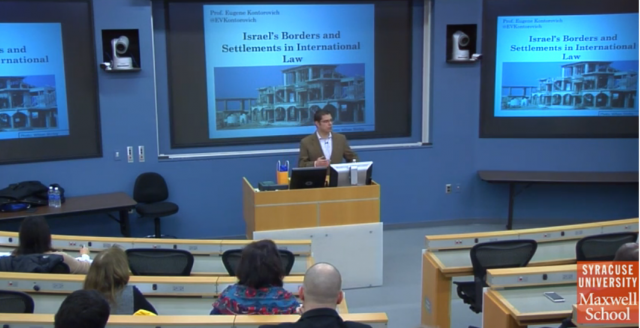
Most people around the world firmly hold to the view that Israel’s residential housing communities built in Judea and Samaria/the West Bank are “illegal”.
For years, this fictitious claim has fed a wild campaign of incitement and ‘lawfare’ against Israel, based on the myth that Jews have no legal right to live or make their homes on Palestinian-claimed lands in the West Bank.
But the truth is that Israel isn’t an unlawful occupying power—certainly not according to any binding international laws.
Now, Northwestern University Professor of Law Eugene Kontorovich, a leading expert in the fields of constitutional law, international law, and the intersection of law and economics, is on a speaking tour of universities and colleges to explain why.
Below I summarize the legal case for Israel’s West Bank settlements according to Kontorovich. A 50 minute video of his remarks is also embedded.
Eugene Kontorovich
Kontorovich is a full professor at one of the nation’s most prestigious universities and schools of law. He regularly writes an opinion column for the Washington Post’s The Volokh Conspiracy where he addresses how the BDS-related measures arrayed against Israel can run afoul of the law (see for example here) and has recently criticized the Obama administration’s stance on anti-BDS congressional legislation (see here and here).
As we highlighted in a post this past summer, he testified before the House against the argument that economic boycotts of Israel are justified or required by international law, and on the role that Congress can play in opposing BDS in ways consistent with U.S. law and policy.
In a post back in 2013 we also featured one of Kontorovich’s lectures on the topic of Israel’s occupation. In it, he claims that presenting Jewish settlement in the West Bank territory (ancient Judea and Samaria) as illegal or ‘colonial’ ignores both the historical complexities of the issue and the legal circumstances.
His current presentation updates the arguments he presented then, bolstering them with new comparative research on “other countries’ settlements” and how the international community has reacted to these occupations.
Last Thursday I had the pleasure of hearing him speak at a talk hosted by Syracuse University’s Institute for National Security and Counterterrorism (INSCT), where I’m affiliated.
Speaking this Thursday at Syracuse University. https://t.co/acT9B1B9jg
— Eugene Kontorovich (@EVKontorovich) February 27, 2016
Sponsored through the generous funding of long-time INSCT benefactor Carol Becker, Prof. Kontorovich spoke at its Middle East Security Speaker Series. It’s already brought to my campus nearly a dozen Israeli and U.S.-based scholars who’ve delivered informative talks on the Jewish state’s many security challenges (for a complete listing and video recordings of these guest presentations, see here).
A video of Prof. Kontorovich’s 50 minute lecture with Q&A has now been posted on INSCT’s YouTube Channel. It’s well worth listening to the whole talk. But for those readers with limited time, I summarize its key points below.
WATCH: Israel’s Borders and Settlements in International Law
Kontorovich headed up to Syracuse in central NY after giving talks at Rutgers and Columbia University.
Looking forward to speaking on Israel & Int'l law tomorrow @Columbia, 8pm, just in time for Israel Apartheid Week, I believe. Should be fun.
— Eugene Kontorovich (@EVKontorovich) March 1, 2016
At both campuses he told me that the Jewish student organizations hosting his lectures “practically begged” him not to be “too controversial”.
It’s sad to hear that the Jewish kids at my alma mater (Columbia) are so fearful of causing offense that they’d stoop to imploring a guest speaker to temper his remarks and skirt the truth.
Of course, Kontorovich was having none of that. He told me that he managed to calm the students down, and proceeded to give the exact remarks that he had planned to deliver. Turns out the Hillel students had nothing to worry about—in both venues Kontorovich’s “controversial” speeches generated a robust and stimulating debate, promoting the very learning that is the academy’s core purpose.
Here’s the gist of Kontorovich’s talk, which also generated good feedback at the Maxwell School during the Q&A:
-
International law derives from treaties and custom, not United Nations General Assembly resolutions which are non-binding and thus don’t oblige any action.
Kontorovich began his lecture by noting that in July 1922 it was the League of Nations that established the Mandate for Palestine, deemed as “reconstituting” a “national home” for the “Jewish people”.
The word ‘settlement’ first appears in Article 6 of the Mandate: “close settlement by Jews on the land” was to be allowed and even encouraged. And it’s the League of Nations’ Mandatory borders that are binding.
-
When new countries are established, the most recent administrative border is what counts.
Kontorovich argues that while the League of Nations’ mandates have been contested by states that have sometimes refused to be bound by them (for example, by Iraq in its claim against Kuwait), these objections have no basis in international law. In 1948 the borders of Israel were supposed to be those of Mandatory Britain. The Green Line, or 1949 armistice lines, which are neither a political nor a territorial boundary and have no legal force under international law, didn’t correspond to any prior administrative border.
So Kontorovich says that once Great Britain left, the mandate over Palestine—which was explicitly for the purpose of re-establishing a Jewish national home—just expired. The area became essentially a territory without a sovereign.
Further, it was Jordan’s “belligerent occupation” of the West Bank that was illegal. Jordan unlawfully invaded and annexed Judea and Samaria. In 1967, Israel ended this illegal occupation in a war of self-defense, taking control of the territory. This suggests that it’s actually Israel which has a strong claim of sovereign title to the territory, by virtue of its having retaken the area from an unlawful Jordanian presence. The case of Israel is unique because there’s no prior instances where a new state’s territory was immediately occupied. But Israel has valid claims to legal title of the West Bank, and now legally holds it.
-
The fact that Jewish civilians live today in the West Bank isn’t an international crime.
Kontorovich explains that the Fourth Geneva Convention’s Article 49(6) has been grossly misinterpreted over the years to be a prohibition against the occupying power’s citizens. In fact, it’s only a set of injunctions on the occupier, and was explicitly meant to prevent the kinds of deplorable forcible deportations and mass transfers of peoples perpetrated by Nazi Germany during World War II.
Article 49(6) doesn’t say that civilians can’t voluntarily move to live in occupied territory. Nor does it require occupying powers to make it difficult or burdensome for civilians to reside in these territories.
With regard to the West Bank, a sizeable portion of Jewish Israelis who live there today didn’t move into the area, much less were they transferred there by Israel—they were born there! And these settler babies and kids aren’t there illegally.
So Article 49(6) doesn’t create a “no-go zone” for the nationals of the occupying power who wish to migrate into the occupied territory. Israel has indicated a willingness to trade away some of this territory as part of a negotiated agreement—having rights and title to territory doesn’t mean a state can’t waive them. But until that day comes, nothing in the Geneva Conventions makes it unlawful for Israeli citizens to voluntarily settle in a territory with no other legal sovereign.
-
Many other nation-states are regarded as occupiers under international law and have populated these territories with settlers, but these actions have garnered virtually no international opprobrium in comparison to the negative reactions toward Israel’s settlement of the West Bank.
At the conclusion of his talk, Kontorovich noted the double standards that have politicized international law, and undermined its integrity. Only Israel’s actions in the West Bank are deemed unlawful and worthy of boycott, even as plenty of other countries—including America—have occupied territories and enabled their citizens to live in them.
Kontorovich points to over a dozen other cases (e.g., Morocco’s occupation of Western Sahara; Turkey’s occupation of Northern Cyprus) along with a few that are less well known, like the U.S. occupation of West Berlin which ended in 1990.
EU doesn't threaten to recognize WSahara in frustration at stalled peace process, or label Moroccan settlement goods https://t.co/aOBkNRprKR
— Eugene Kontorovich (@EVKontorovich) March 7, 2016
Americans were never prevented from living in West Berlin or from opening up businesses there. Nor were any third parties ever told that they had a legal obligation to boycott American-owned companies there. In fact, Kontorovich notes that no one made any fuss when Burger King opened a branch in West Berlin. And during the 1970s and 1980s the place became a popular destination for many American artists and musicians.
Here’s a slide he showed that’s based on ongoing and a not-yet-complete research project:
Why Kontorovich’s Lecture Needs to be Shared
In a recent article in Newsweek, the Jewish owners of Israel’s settlement wineries explain how they plan to keep their businesses afloat in the wake of the European Union’s new guidelines for specifically labeling products imported into the bloc from West Bank communities.
Given that Newsweek isn’t known for publishing essays that are highly charitable to Israel, I was pleasantly surprised by this one.
It reviews the nature of the controversy well (the EU claims it’s simply a “technical” decision that allows consumers to make more informed purchasing decisions; Israeli officials have countered that the labeling is a symbol of bigotry and legitimizes wider anti-Israel boycotting).
But the bulk of the essay, and its best parts, focus on how Jewish vinters are planning to cope with the losses from the EU decision, since current European sales are already starting to dry up now that skittish importers are balking at taking a risk on settlement wines.
The article includes interviews with a number of winery owners and founders (there are about 30 wineries in the West Bank), and does a good job of relating not only why they’re so “furious” about the EU’s decision, but also the different ways in which these winemakers are now aiming to “fight back”.
So overall this is a decent article. But embedded within it, almost like a throw-away, is this line:
The settlements in East Jerusalem, the West Bank and the Golan Heights are defined as illegal under international law as Israeli forces captured the territories, where more than half a million Jewish settlers now reside, in the 1967 Six day War”.
Such statements are a dime a dozen.
Even otherwise well-written articles note these fallacies as incontrovertible ‘facts’.
This is why Prof. Kontorovich’s lecture and larger body of work needs to be disseminated widely: because if a lie is repeated often enough it becomes the truth, but if we share the truth and repeat it over and over again, there’s the chance that people will be convinced and will give up the lie.
Conclusion
In a compelling new presentation that he’s now delivering on various U.S. college campuses, Northwestern University expert of international law Professor Eugene Kontorovich exposes the myth of an unlawful Israeli occupation.
If you’re interested in reading more of his work on Israel’s borders and territorial scope he has a new article on it (with Prof. Abraham Bell). It looks at how the customary international law doctrine of uti possidetis juris would support Israel’s claims to any or all of the hotly disputed areas of Jerusalem and the West Bank.
After his lecture on my campus, Kontorovich had to rush off to give a talk at Cornell on maritime piracy—the main focus of his current research when he’s not writing and speaking on the “legal ghetto” that the European Union and others are trying to build around Israel.
But before he left, I was able to quickly ask him why he thought Israel’s detractors hinge so much of their argument on international law.
Here’s his response:
I think we have a mistaken notion of what an anti-Semite looks like. We think of such people as uncouth and uneducated. But, in fact, throughout history, anti-Semites have always been cultured and well-educated. Today’s anti-Semites are also well-read—many have multiple advanced degrees. And they insist that they can’t possibly be viewed as anti-Semitic because they speak about human rights. They claim that they’re not objecting to Jews as people, and only to the unlawful Jewish state’s actions. It’s a fallacious argument. Because anti-Semitism has always been phrased as objections to what Jews do and how they act—they killed the messiah; they created a capitalist society; they founded communism. It’s always been a unique, disproportionate, and irrational focus on the Jews”.
Basically, it’s more or less what we see today in the singling out of Israel in the application of international law.
Note: minor revisions to the original post were made after publication.
——————-
Miriam F. Elman is an associate professor of political science at the Maxwell School of Citizenship & Public Affairs, Syracuse University. She is the editor of five books and the author of over 60 journal articles, book chapters, and government reports on topics related to international and national security, religion and politics, the Middle East, and the Israeli-Palestinian conflict. She also frequently speaks and writes on the Boycott, Divestment, and Sanctions (BDS) anti-Israel movement. Follow her on Twitter @MiriamElman
Donations tax deductible
to the full extent allowed by law.


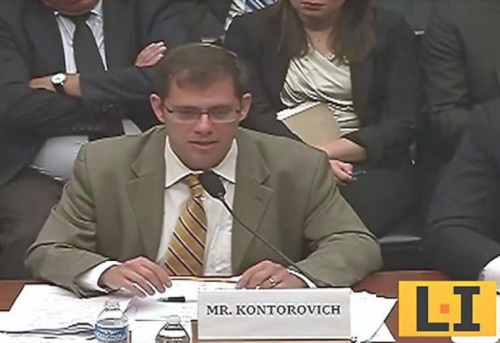





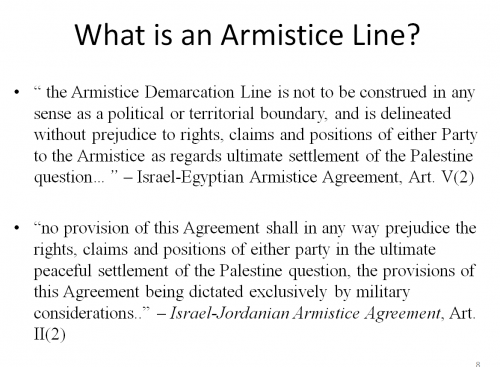
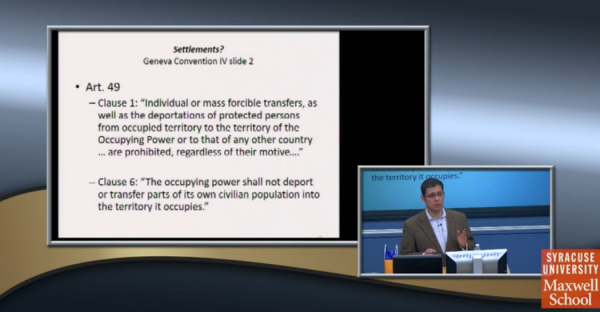

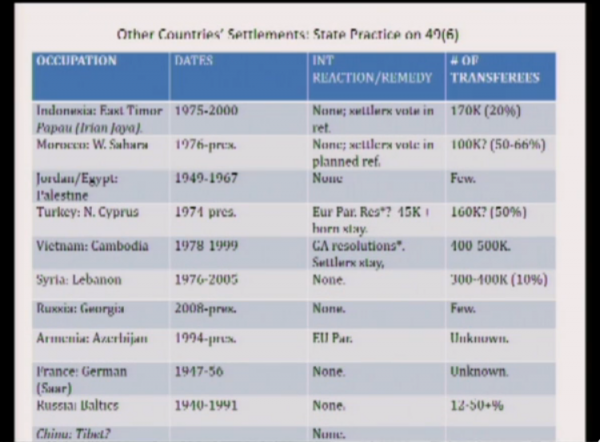


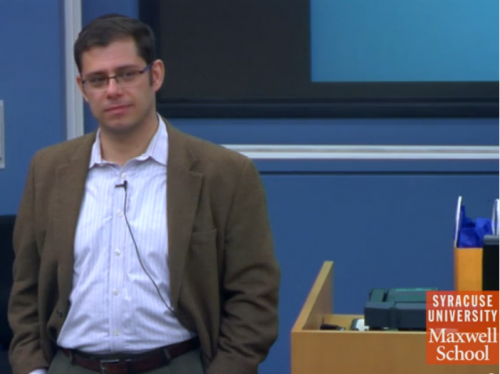
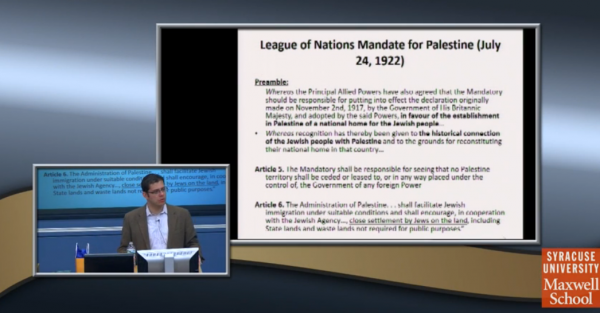
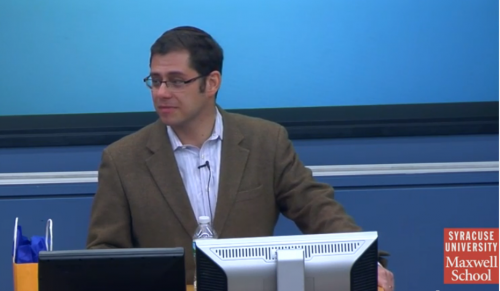







Comments
I’ve never seen Israel permanently annexing the West Bank as a problem. I think they were foolish for abandoning Gaza.
I have read the same arguments previously. With these legal arguments available, why is it that so many Israelis support giving the West Bank to the Arabs.
Because they think it will buy them peace. And because so many of them are “post-zionists” who have lost any sense of connection to their country, and actually believe that they are colonists in someone else’s native land, and would gladly move to America or Europe if they could get visas. And in many cases, it’s also because they perceive the “settlers” as some sort of religious fanatics who are completely alien to them, and would be happy to see them massacred. (In fact a large percentage of Jewish residents of Judea, Benjamin, and Samaria are not religious.)
Caroline Glick makes the case for “Occupation”
http://www.jpost.com/Opinion/COLUMN-ONE-The-fourth-strategy-447561
” Governing enemies is unpleasant. It brings no instant gratification. Instead it promises only thankless, Sisyphean efforts. In other words, governing your enemies is the price you pay to be free. “
So true and remember those “enlightened” Jews who graduate from liberal universities are more concerned with giving the appearance of being for “human rights” than they are with protecting their own people from economic and physical attacks.
I’m waiting for the SJW types to bring the same kind of action against the US WRT the southwest and Mexico. I think that the illegal invasion is part of the long term strategy in that direction.
I wonder if we can consider all the Mexican nationals occupying southern California as a violation of international law.